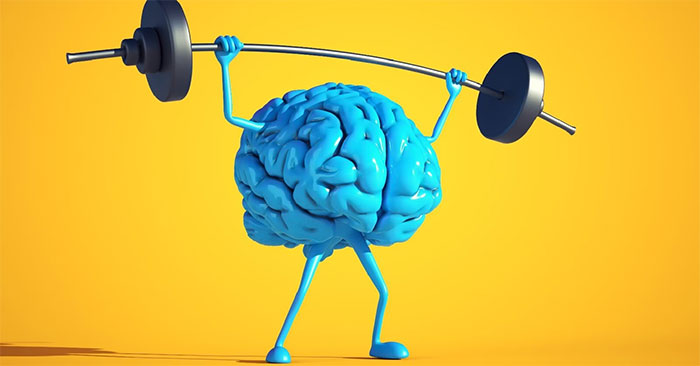9 brain exercises to help enhance memory and concentration
Engaging in brain exercises, such as completing sudoku puzzles, helps boost cognitive abilities, memory, and overall mental health.
We all experience low spirits from time to time, but factors such as stress, aging, not getting enough sleep or an unhealthy lifestyle can make it worse. This can have a marked impact on memory, problem-solving skills, and overall cognitive function.
Engaging in brain training exercises can enhance mental agility and help your brain stay focused and resilient. Below are some carefully researched exercises and games for your reference.

1. Learn a new language
Learning a new language can benefit the brain by:
- Improve cognitive function
- Improve memory
- Improve problem solving skills
An easy way to get started is with language learning apps or online courses, which provide a structured and convenient approach to learning a new language.
A 2018 study found that learning a new language can lead to changes in brain structure, giving it more capacity to cope with age-related cognitive decline.
2. Read and take active notes
As you read, actively analyze the material by taking notes or highlighting key points. This method can:
- Increase concentration
- Enhance understanding
- Improve memory retention
A high school-led study published in the Journal of Student Research aimed to determine the most effective note-taking methods in students aged 13-18. Participants were assigned to type, handwrite, or take no notes while watching the video, followed by a rating.
The results show that typing notes is the most effective method, providing the highest ability to remember documents.
3. Breathing Awareness Meditation
A small 2018 study found that practices such as meditation and mindfulness can enhance:
- Cognitive processes: Attention, working memory, and executive function
- Metacognitive abilities: Organizational, planning and problem-solving skills
To practice mindfulness meditation, sit in a quiet place, close your eyes, and focus on your breathing. Take a deep breath, count to four, then exhale slowly. Next, focus on the sensation of your breathing, which can improve your concentration and reduce stress.
4. Play chess online
Playing chess requires strategic planning and focused attention, providing a comprehensive mental workout for the brain.
An analysis of 24 studies found that chess instruction can improve math achievement and overall cognitive ability in elementary and middle school students, with minimal effective practice time of about 25-30 hours.
More conveniently, there are online chess apps that you can play on your phone in your free time.
5. Dual n-back training
Dual n-back training is a cognitive exercise in which you are asked to remember both visual and auditory stimuli. In this task, you must keep track of the location of visual stimuli, such as squares on a grid, and the identity or location of auditory stimuli, such as sounds or letters, in a sequence .
As difficulty increases, you will need to recall stimuli from multiple positions in the sequence. This training is said to enhance working memory and cognitive abilities.
A small study from 2020 with 54 subjects found that after 16 sessions of dual n-back gaming, participants improved working memory performance.
You can find dual n-back exercises online on many websites and apps dedicated to brain training.
6. Crossword puzzle
A crossword puzzle is a game that requires you to fill in a grid of words, using clues to determine the correct answer. Participating in crossword puzzles can increase awareness by stimulating:
- Vocabulary
- Memory
- Problem solving
- Knowledge generality
In a 78-week study in people with mild cognitive impairment (MCI), researchers found that home-based web crossword puzzles were more effective in improving cognitive function than with other web-based cognitive games.
7. Sudoku
Sudoku is a logic-based puzzle that involves filling a 9×9 grid with numbers such that each column, row, and 3×3 sub-grid contains all the digits from 1 to 9 without repetition. It requires both logic and attention.
A small 2020 study investigated participants' brain activity as they solved Sudoku puzzles. Researchers found that when people engage in Sudoku tasks, both medial and lateral regions of the prefrontal cortex (PFC) are involved.
The medial PFC becomes especially active when their brains are looking for logical rules and strategies to solve Sudoku puzzles.
Findings suggest that Sudoku can be used for cognitive training, especially for neuropsychiatric disorders related to the PFC, including:
- Depression
- Bipolar disorder
- Alzheimer
8. Play Go
Go is an ancient Chinese board game that involves complex decision making, spatial reasoning, and long-term planning. Playing Go can help improve:
- Cognitive skills
- Think strategically
- Concentration
There are several apps where you can play Go on both iOS and Android devices.
One study found that Go players, especially those with advanced master's degrees, had exceptional cognitive reflection test (CRT) scores. CRT scores are closely related to play intensity but not closely related to play frequency.
People who play Go regularly also tend to possess a stronger mind, which is the ability to understand and attribute mental states, such as beliefs and emotions, to themselves and others, contributing to their social cognitive skills.
9. Play Bridge
Bridge is a card game that involves critical thinking, memory and strategic decision making. It can be a fun way to keep your brain sharp.
An older study of people ages 55-91 found that playing bridge may improve working memory and reasoning, but not vocabulary and reaction time. But more research is needed to support the effectiveness of playing Bridge.
You should read it
- 12 exercises to have strong legs for all ages
- 8 benefits of Workout training for the brain
- Please download VnDoc's Exercises app to make learning easier
- C ++ exercises about IF ELSE
- How does daily activities affect the brain?
- You are often teased as the 'goldfish brain', do not be sad this indicates you have a brain that works very well
 Germany and France break through in developing MGCS tanks 'stronger than Armata'
Germany and France break through in developing MGCS tanks 'stronger than Armata' The US laser weapons program went up in smoke
The US laser weapons program went up in smoke Will Netflix bring games to smart TVs and iPhones as controllers?
Will Netflix bring games to smart TVs and iPhones as controllers? Will Google weather the legal storm?
Will Google weather the legal storm? The White House makes a final push for an internet subsidy program for 23 million American households
The White House makes a final push for an internet subsidy program for 23 million American households TikTok was investigated for privacy invasion
TikTok was investigated for privacy invasion